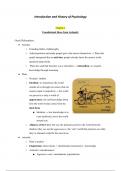Samenvatting
Summary - Introduction to Psychology & History of Psychology (595102-B-5)
- Instelling
- Tilburg University (UVT)
This is a summary of all the chapters and lectures of the subject Introduction to Psychology & History of Psychology. I got an 8 on the exam after studying these notes. Good luck studying! :)
[Meer zien]




